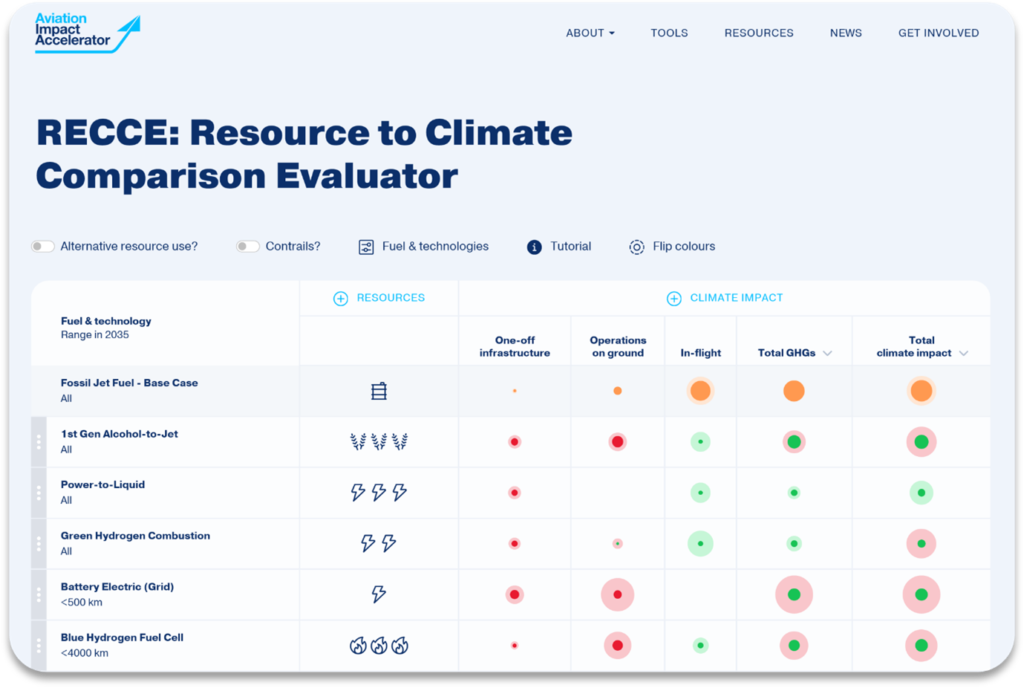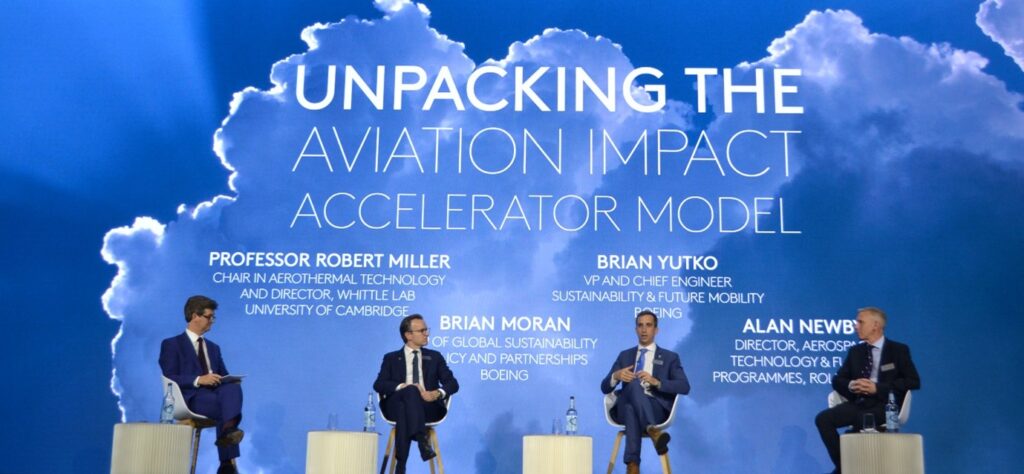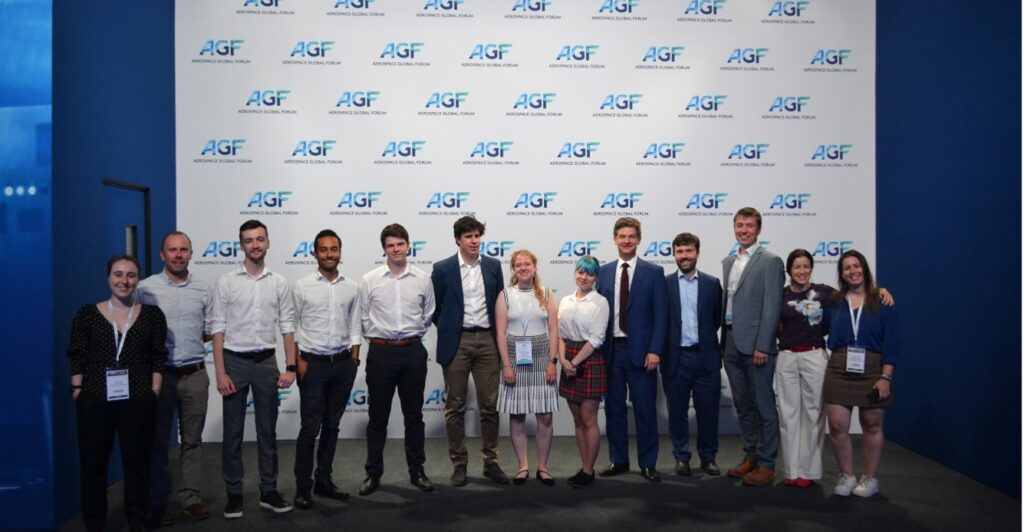On 18 July 2022, the AIA team visited the Aerospace Global Forum (AGF), a brand-new platform developed as part of the 2022 Farnborough Air Show and aimed at driving immediate action towards net zero aviation. As part of this event, the AIA launched a new interactive tool aimed at accelerating the transition to net zero aviation, as well as hosting a number of panels and publishing a new report in collaboration with the World Economic Forum (WEF).
Launch of new AIA tool: RECCE
The AIA’s first interactive tool, which was launched at the event – the Resource to Climate Comparison Evaluator (RECCE) – can be used to directly compare alternative aviation fuels based on their climate impact, resource requirement and costs. The tool provides a detailed breakdown of where in the system emissions occur and where the uncertainties are.
Eliot Whittington, Policy Director at the Cambridge Institute for Sustainability Leadership (CISL) and AIA co-lead said “If we think about the job of transforming the aviation sector so that it becomes environmentally sustainable that means a wholesale transformation of the system. It is not as simple as taking one technology and swapping it for another, we need to think about changing infrastructure, we need to think about business models, we need to think about public acceptability and policy.
“Ultimately, we need to see the whole ecosystem transforming all at the same time. RECCE allows users from policy makers and industry players to the public to understand and compare a range of technology pathways, understanding the resources they require and their relative climate impacts.”
You can find RECCE at our website here.

High-level speakers advancing a vision for net zero aviation
The AGF brings together global leadership from across the aviation ecosystem to catalyse action towards sustainable aviation in this critical decade. The event was opened with a video address from His Royal Highness The Prince of Wales, who said “If I can leave you with one message, the real risk is not taking risks. We are in a critical decade of action for climate change and nature, we much push forward much faster.” He added that “We know as well that change at scale will take time to bring about. Failure to act now, to seize this moment, to be bold and brave in the face of a future that needs to be built will mean letting down our children, our grandchildren and ourselves.”
The opening address was followed by two high-level panels, including one chaired by Professor Rob Miller, Director of the Whittle Laboratory and AIA lead, which focused on accelerating sustainable aviation. Panellists included Willie Walsh (Director General, IATA), Warren East CBE (CEO, Rolls-Royce), Laia Barbarà (Community Lead, WEF), and Jim Hileman (Chief Scientific and Technical Advisor for Environment and Energy, FAA).
Willie Walsh said “We have to be driven by data and by science – it is good to be ambitious and set targets, but it is also important to be honest and use pathways that we understand to decarbonise aviation”
The discussion highlighted the ambition from key players in the sector to reach the net-zero aviation by 2050 target but there was disagreement on the potential roles that different technology options could play in reaching this goal.
Following this thought-provoking discussion, the AIA showcased its whole-system modelling approach to unlock change by demonstrating RECCE and our Journey Impact Simulator, which allows the user to select a particular journey in the future, explore different fuel, technology and policy choices and extend this journey up to the world scale. The AIA plans to release the Journey Impact Simulator to the public soon and in the meantime will continue work with global experts in technology, policy and economics to develop the tool further.
New industry partnerships
At the end of the AIA event, Professor Miller announced that three key industry players will be partnering on the AIA initiative. Working with Boeing, Rolls-Royce and Etihad Airways will accelerate the AIA’s work towards net zero aviation and provide in-depth technical and policy expertise.
Professor Miller said “Achieving an aviation sector with no climate impact is one of society’s greatest challenges and it is only through a true partnership between industry, academia, and government that we will be able to understand the whole system and accelerate change. I am delighted that Boeing, Rolls-Royce and Etihad will be joining stage two of the Aviation Impact Accelerator as we work to accelerate the transition to sustainable aviation.”
Representatives from Boeing, Brian Yutko (Vice President and Chief Engineer, Sustainability & Future Mobility), Brian Moran (Vice President of Global Sustainability Policy and Partnerships) and from Rolls-Royce, Alan Newby (Director, Aerospace Technology & Future Programmes) joined Rob on stage to celebrate this announcement and join the AIA in calling for more industry players to get involved in the initiative.

“We are committed to ensuring the aviation industry meets its net zero carbon emissions goals and preserving all the societal benefits it has to offer. It will take industry, academia and others coming together to collaborate and invest in scientific research and developments,” said Brian Moran. “We are grateful that the University of Cambridge shares this same sentiment and are honoured to further strengthen our partnership with them on the important work to decarbonize aviation.”
Grazia Vittadini, Chief Technology and Strategy Officer at Rolls-Royce, said: “The Aviation Impact Accelerator is a great example of fast-forward thinking. It integrates industry capability and knowledge with academic rigour and holistic modelling to understand the lifecycle impact of technology on the complete aviation ecosystem, leveraging networks and communities of practice to solve the complex and daunting challenge of decarbonizing our skies. We’re proud to be a partner.”
Tony Douglas, Group Chief Executive Officer at Etihad Aviation Group, said “We are proud to be partnering with one of the world’s leading jet engine research labs to further support the decarbonisation of our industry. Etihad is committed to sustainability and the dedication of its fleet as flying test-beds for research & innovation through the Greenliner and Sustainable50 programmes, and this new collaboration with the University of Cambridge, through the Aviation Impact Accelerator, will allow for more industrial and academic synergy”
New AIA and WEF report: Unlocking Sustainable Battery and Hydrogen Powered Flight
Tomorrow (Tuesday, 19th July) the AIA, in collaboration with the World Economic Forum (WEF) will launch a new insight report, Unlocking Sustainable Battery and Hydrogen Powered Flight, as part of the Target True Zero collaboration run by the WEF. The report seeks to assess the potential for battery-electric aircraft, hydrogen fuel cell electric aircraft and hydrogen combustion aircraft to contribute to decarbonising aviation, and identifies critical areas of uncertainty.
Working with influential industry players is central to the AIA’s approach and the team is proud to be a knowledge partner on the Target True Zero (TTZ) initiative, which is made up of industry players focused on accelerating the deployment and scaling of zero-emission aviation, leveraging electric and hydrogen flight technologies.
Other news
The AIA also launched a video documentary in collaboration with the Aerospace Global Forum which brings together voices from the global experts contributing to the AIA. The video highlights the need to bring together academia, industry, civil society and Government to drive change. You can read about this on our website here.
You can find the full documentary here:https://youtu.be/1f2d5UVpjV0
A shorter version is also available here: https://youtu.be/ErsMEiPOqlo
Finally, we would like to thank our brilliant team at the AIA, without whom all of these achievements couldn’t have come together.

Beth Barker – Manager, Aviation Impact Accelerator
Jenifer Elmslie – Project Manager, Aviation Impact Accelerator